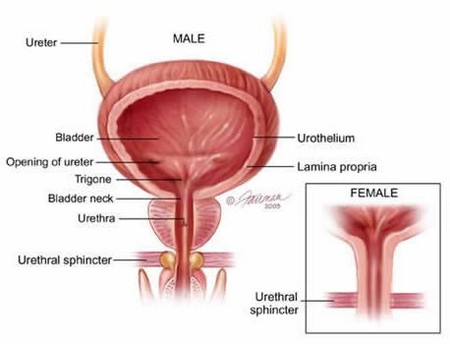Difficulty in the control of the bladder or bowel can occur at any age if there has been damage to the area or to the brain. The involuntary escape of urine or the emptying of the bowel is a very distressing and humiliating experience, and it is not surprising that people suffering from incontinence often isolate themselves.
Urinary incontinence
The bladder is a muscular bag, the outlet of which is guarded by two circular bands of muscle. A small baby has no control over this muscle and its bladder empties immediately and involuntarily. As we grow and the nerve pathways develop, we learn to control the muscle. From then on we are conscious when the bladder is full and have the control to wait for a convenient place before passing urine. It is when something disturbs that control, such as infection, injury or degeneration, that we become once more unable to control the muscle: this is known as being incontinent.
Incontinence in children
The child who has gained control over his bladder may become incontinent because of some interruption in the normal pattern of development. There may be a physical cause or an emotional one. Parents usually find it very distressing and clinics exist to help the family to overcome the problem.
Another worry is the child who is exceptionally late in gaining control over his bladder. Many children develop slowly and Parents often forget how difficult it is for a child to accept enforced delay, even after he has gained control of his bladder. Staying dry at night is often seemingly impossible to achieve, and may take some time. If consistent incontinence is going on up to and beyond the age of eight years, parents would be wise to seek medical advice.
Stress incontinence
Many women suffer from stress incontinence, especially after childbirth. This means that whenever sneezing, coughing or laughing raises the intra-abdominal pressure, urine escapes involuntarily, causing embarrassment and discomfort.
The condition is due to the stretching of the ligaments and muscles that support the womb (uterus). The womb drops and in so doing presses on the bladder. This is known as a prolapse, which may have to be cured by an operation.
Incontinence in older men
The older man may sometimes find it difficult to pass urine even though his bladder is full (a condition known as retention of urine). This is because the prostate gland, which encircles the top of the urethra, has become enlarged and is making it difficult for urine to get past. The bladder becomes overfull and eventually urine dribbles out (retention with overflow). This type of incontinence can also be treated by an operation.
Incontinence in the physically handicapped
Anyone who has damage to the spinal cord and who is a paraplegic has lost control of his bladder. Emptying of the bladder is therefore involuntary and intermittent. Some of these patients eventually re-learn control, but some have to rely on incontinence aids permanently.
Incontinence in the elderly
By far the largest group of sufferers from incontinence are the elderly. They may lose control of the bladder or their decreased mobility may simply make it impossible for them to reach the lavatory in time. The inability to wait: Urgency may be the result of infection, which the doctor may treat with antibiotics. The problem may also be one of mobility. Old people need to get to the lavatory quickly when their bladders are full. If their movements are too slow, accidents occur. Some old people have arthritic hands and find adjusting their clothing difficult. Consider this when buying new clothes. Regular visits to the lavatory (especially after meals), walking aids, and, if possible, a room near the lavatory will all help.
Patients with speech difficulties may be unable to ask for a bedpan. True incontinence: This means that all bladder control is lost. The brain no longer controls the function and the bladder acts as it does in the baby: it empties suddenly, frequently and involuntarily. The loss of control may be only temporary: after a minor stroke, for instance, control is eventually regained; but after severe brain damage, loss of control is permanent.
